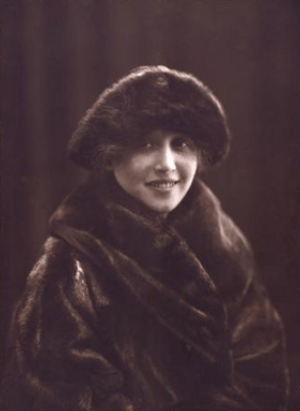Amélia Rey Colaço facts for kids
Quick facts for kids
Amélia Rey Colaço
|
|
|---|---|
 |
|
| Born | 2 March 1898 Lisbon, Portugal
|
| Died | 8 July 1990 (aged 92) Lisbon
|
| Occupation | actor |
| Years active | 70 |
| Known for | Lisbon theatre |
| Spouse(s) | Felisberto Robles Monteiro |
Amélia Rey Colaço (born March 2, 1898, died July 8, 1990) was a very famous Portuguese actress. She was one of the most important actors in Portugal during the first half of the 1900s. She was also a talented theatre manager, who helped create many plays.
Contents
Early Life and Inspiration
Amélia Rey Colaço was born in Lisbon, Portugal, on March 2, 1898. She was the youngest of four sisters. Her family was artistic and came from different countries.
A Family of Artists
Amélia's father, Alexandre Rey Colaço, was a talented pianist and composer. He was born in Tangier and became a music teacher for Portuguese royalty. He even taught Prince Luís Filipe and the future King Manuel II.
Her mother, Alice Lafourcade Schmidt, was born in Chile. She taught her daughters many languages. Alice grew up in Berlin, where her mother hosted a special gathering called a salon. This salon brought together many promising artists. It was there that Amélia's parents met.
Discovering Acting
In 1911, Amélia visited Berlin with her sister. She loved the artistic atmosphere at her grandmother's salon. She also saw plays directed by Max Reinhardt at the Deutsches Theater. These shows made her want to become an actress.
When she returned to Portugal, Amélia started taking acting lessons. Her teacher was Augusto Rosa, a good friend of her father. In 1915, she performed for King Alfonso XIII in Madrid. This experience helped her get used to performing for important audiences.
Becoming a Star
Amélia Rey Colaço made her acting debut in 1917. She performed at the Teatro República (now Teatro São Luiz) in Lisbon. The play was Marinela, about a young homeless girl.
Preparing for a Role
To play the character of Marinela, Amélia worked very hard. She practiced walking barefoot and wearing old clothes for months. She did this in her family's garden to truly understand the role.
Her performance was a huge success. The newspapers in Lisbon praised her acting. She shared the stage with famous Portuguese actresses like Palmira Bastos and Adelina Abranches. Amélia stayed at the Teatro São Luiz until 1919.
Starting Her Own Company
In 1920, Amélia married actor and director Felisberto Robles Monteiro. Together, they started their own theatre company. It was called the Companhia Rey Colaço-Robles Monteiro.
This company lasted for 53 years. They mostly performed at the D. Maria II National Theatre in Lisbon. The company also toured to other parts of Portugal, including the islands.
The Rey Colaço-Robles Monteiro Theatre Company
The company's first play was Zilda. Amélia was seen as bringing a new, modern style to Portuguese theatre. She created many different plays for the company.
Facing Challenges
Amélia had to deal with censorship from the government of the time, known as the Estado Novo. This meant that some plays or ideas were not allowed. Despite this, she managed to put on many ambitious shows.
The company was known for its amazing stage designs. Amélia worked with famous artists to create the scenery. These included architect Raul Lino and painter Eduardo Malta.
Training New Talent
Her company hired some of the best actors in Portugal. These included Palmira Bastos and Laura Alves. Amélia also helped train a new generation of actors and directors. Some of these were João Villaret and Ruy de Carvalho.
The company performed both classic and modern plays. Amélia introduced Portuguese writers like José Régio to the audience. She also brought plays by famous foreign writers to Portugal. These included Jean Cocteau and Federico García Lorca.
Overcoming Setbacks
In 1958, Amélia's husband passed away. This was a very difficult time for her. She took over running the company and shared directing duties with her daughter, Mariana.
The company faced financial challenges. Then, a big fire broke out at the National Theatre in 1964. All their sets, costumes, and props were destroyed. These items had been collected over 43 years.
Even after this disaster, Amélia kept going. She rented another theatre, the Teatro Avenida. There, she put on a play called O Mutim. The play was banned by the government shortly after it opened. This was because some scenes were thought to be about the dictatorship.
In 1967, the Teatro Avenida also burned down. Amélia rented yet another theatre. She made her last appearance as an actress in 1973. In early 1974, her company returned to the Teatro São Luiz, where she had started.
On April 25, 1974, the Carnation Revolution happened. This event ended the authoritarian government in Portugal. Amélia decided to suspend her company.
Later Years and Legacy
In 1982, Amélia Rey Colaço appeared in a television series. It was called Gente fina é outra coisa. She also helped the National Theatre Museum improve its exhibitions.
Her last television role was when she was 87 years old. Amélia Rey Colaço passed away on July 8, 1990, in Lisbon. She left behind a huge legacy in Portuguese theatre.
See also
 In Spanish: Amélia Rey Colaço para niños
In Spanish: Amélia Rey Colaço para niños

